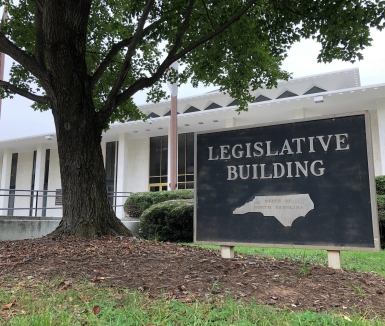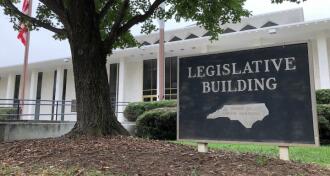This article was co-authored by 2021 Government Relations intern Colin Russell.
Since convening in January, the North Carolina General Assembly's Long Session has been marked by lengthy state budget negotiations, starts and stops, and several historic pieces of proposed legislation.
American Rescue Plan (ARP) funding from the federal government is pouring into North Carolina. Add these funds to Coronavirus Aid Relief and Economic Security (CARES) Act dollars the State received last year and an already hefty surplus, and the State's General Fund is sitting at a record high balance.
The State's current $5.5 billion surplus positions lawmakers to fund several big-ticket priorities this session, potentially including:
- Broadband expansion;
- Flood mitigation and prevention;
- Wastewater, stormwater, and drinking water projects;
- State government infrastructure needs;
- University and community college construction projects; and,
- Local government special projects.
The Senate's budget shows us that Senate Republicans prefer to spend the surplus funds on projects and initiatives with one-time, nonrecurring funding. They favor this approach over creating new programs that would necessitate annual, recurring funds or providing significant raises to state employees and teachers. The rationale for this approach is that much of the surplus was derived from one-time rescue funds that are unlikely to recur in future budget cycles.
Lawmakers must also consider the state of the economy when making fiscal decisions for the state. The Legislative Fiscal Research Division and the Office of State Management and Budget's most recent revenue forecasts indicate that the state's economy is roaring back. The joint forecast of State tax revenue shows that North Carolina is expected to generate $6.5 billion more in revenue over the next two years than previously thought.
Other indicators, including unemployment levels, new home sales, and consumer confidence, also paint a rosy picture for the State's fiscal health as does business filing data released by the NC Secretary of State. That data shows North Carolina is anticipated to have a total of 191,600 new business filings this year, up from 127,300 in 2020 and 100,000 in 2019. Lawmakers weigh these factors against existing fund availability and competing priorities as they fulfill their obligation to prepare a two-year budget plan for our state.
State Budget Negotiations Drag on into the Fall

As is custom, this year, the Governor released a budget recommendation in the spring to frame his own spending priorities and formally kick off the budget negotiation process. Before doing this, his budget team collected requests and priorities from each State agency, balanced them against the Governor's goals, and ultimately selected which items will be added to the full Governor's budget. The Governor's budget is largely symbolic, as the Legislature is the branch of government responsible for drafting and enacting budget legislation, but it plays an important role in the budget process.
Further complicating matters, the Republican-controlled General Assembly and Democratic Governor Roy Cooper have stark differences in policy and spending preferences. Since Republicans no longer hold veto-proof majorities in the House and Senate, both parties recognize they need the other to enact a budget for the state. Although the final budget likely will look a lot different from the Governor's proposal, his budget is still an important part of the process because it illustrates his administration's top priorities, shows Republicans what matters to the Governor in the negotiations, and unites Democratic legislators around a shared legislative strategy.
Governor Cooper released his recommended budget for FY 2021-23 on March 24, 2021. His plan calls for spending of $27.4 billion in FY 2021-22 and $28.5 billion in FY 2022-23. Among his top priorities are expanding Medicaid, raising teacher pay 10% over the biennium, and investing in clean energy.
Traditionally, the two chambers of the legislature take turns releasing the first budget proposal. Under that tradition, the Senate was to go first in 2021. House Appropriations leaders became tired of waiting though and in June, began to hold their own budget meetings before the Senate's budget had been released. The Senate's proposed budget—Senate Bill 105: 2021 Appropriations Act—passed the Senate on June 24, 2021, by a margin of 32-18. All 28 Senate Republicans and 4 Senate Democrats voted for the bill.
Highlights of the Senate budget include:
- Calling for $25.7 billion in state spending in FY 2021-22 and $26.6 billion in FY 2022-23
- A variety of personal and corporate income tax cuts, many of which were offered in other proposals, including reducing the NC personal income tax to 3.99% by 2026. The standard deduction would be increased to $25,500 under the Senate budget.
- A complete phase out of the corporate income tax by 2027
- Reduction and simplification of the State's franchise tax
- Over $100 million appropriated for projects and initiatives that would make the state more resistant to flooding and hurricanes. Ward and Smith has been working on these provisions for over a year on behalf of clients and is thankful for the Senate's support for our requests.
- Direction of $5 billion to the State's Rainy Day Fund, the General Fund savings account that was used to provide relief after Hurricane Florence, during the pandemic, and in response to other disasters
- A "pay as you go" infrastructure spending plan that expends funds for large-scale construction projects over a 10 year period without borrowing or bonding.
- The Senate's proposed budget represents a spending increase of 3.45% over the last enacted budget.
The House of Representatives is working on its budget proposal, with some lawmakers hinting that the House's proposal likely will not be released until early August. We expect the House's budget to mirror the Senate's in many ways but predict that the House will have a stronger appetite for recurring expenses and borrowing funds to pay for infrastructure needs.
After the presumptive passage of the House budget proposal in mid-August in the House, the Senate will likely vote not to concur with the House version. Following that vote, a conference committee will be formed of members from each chamber to negotiate a compromise budget bill. Senate President Pro Tempore Phil Berger estimates the conference committee negotiations to last two to three weeks. A final compromise budget will emerge and both chambers will then pass it, sending it to the Governor.
The bilateral negotiations between the Senate and House will revolve around priorities and specific initiatives, rather than the total spending amount. The overall spending amount of the proposed state budget has already been agreed upon between the two chambers. As such, the overall spend of $25.7 billion in FY 2021-22 and $26.6 billion in 2022-23 will almost certainly be the final figures.
However, before the consensus budget is finalized, Republican legislative leaders are expected to invite Governor Cooper and administration officials in for so-called "trilateral" negotiations. Trilateral negotiations and other front-end consensus building would be encouraging and could only improve the odds of a state budget ultimately being signed into law.
The effectiveness of these negotiations will ultimately depend upon how far either side is willing to compromise. We expect that the motivation to enact a budget is there. North Carolina is sitting on an unprecedented budget surplus and is motivated to get those funds to the right places. If the parties cannot strike a compromise in the conference committee, Republicans will likely try their hand at passing a budget without the Governor's support. He can exercise his constitutional right to a veto, but with the support of three-fifths of each chamber of the General Assembly, Republicans would be able to override that veto.
In the Senate this year, 32 members voted to support the budget bill. The veto override threshold is 30 votes in the Senate and 72 votes in the House. It is impossible to predict how many House members will vote for the House budget, but we expect at least all 69 Republicans to support it. During the budget votes in the last Session, the Democrats who initially supported the budget fell in line with their party when the veto override vote was held, illustrating why you cannot rely on initial voting records to predict final outcomes. We will know for sure whether the state will have a budget soon, most likely in early September.
Senate Republicans Spar with Governor Cooper over NC DEQ Appointment
Possibly compromising some of the good faith between Republican and Democratic leaders was a contentious stand-off in June over Governor Cooper's Department of Environmental Quality (DEQ) Secretary selection. Senate Republicans voted down Governor Cooper's appointment of Dionne Delli-Gatti as Secretary of DEQ in June. Senate Republicans contended that there were deficiencies in Delli-Gatti's background in natural gas policy.
In a surprise to many, the Senate amended Delli-Gatti's confirmation resolution (SR 719) to disapprove of her appointment. The Senate's move to adopt the resolution and effectively end her candidacy was unexpected, particularly since the Senate has never rejected a gubernatorial appointment in North Carolina history. Governor Cooper responded by hiring Delli-Gatti as DEQ's Director of Clean Energy.
On June 24, Governor Cooper tapped agency veteran Elizabeth Biser to lead DEQ. Her formal confirmation has not taken place yet, but she is fully authorized to exercise all the powers of Secretary in the interim. Secretary-elect Biser is a friend of ours, and we wish her nothing but success in her new role.
Medical Marijuana Legislation Steadily Advancing in the Senate

There is an unprecedented level of support and momentum at the General Assembly this session to enact legislation to legalize marijuana for medical use. Popular opinion around medical marijuana has shifted dramatically in recent years as 36 states have legalized the medical use of marijuana and 18 states legalized recreational use. A poll conducted by Elon University in January 2021 found that 73% of North Carolinians support medical marijuana and 54% support recreational marijuana.
Senator Bill Rabon, the influential Republican Senate Rules Chairman from Brunswick County, is the primary sponsor of Senate Bill 711: NC Compassionate Care Act. He cites his personal experience as a cancer survivor as the foundation for his support of medical marijuana. The bill outlines a narrow list of medical conditions that would allow an individual access to medical marijuana in North Carolina if the bill were enacted, including cancer, epilepsy, HIV/AIDS, ALS, Parkinson's disease, PTSD, and Crohn's disease.
While S711 is better positioned for enactment than any other cannabis legislation that has come before it in North Carolina, it still faces a handful of significant obstacles, such as the Hastert Rule. This rule, which is currently observed by the Senate, dictates that the President Pro Tempore will not schedule a floor vote on any bill that does not have majority support within his own party—even if the majority of all the members of the chamber would vote in favor of the bill. Under this rule, at least 15 of the 28 Senate Republicans would need to support the bill for it to be scheduled for a vote on the Senate floor.
Historic Flood Mitigation and Disaster Relief Funding Poised to Become Law
After years of devastating hurricanes, flooding, and other natural disasters in North Carolina, legislators are prioritizing funding for a significant investment in disaster relief and flood mitigation measures. House Majority Leader John Bell has championed his legislation on this topic —House Bill 500: Disaster Relief and Mitigation Act of 2021—during committee meetings and media engagements. Bell has long been an advocate for disaster preparedness and response in North Carolina, and we applaud his efforts to lead the House on this historic flood preparedness overhaul this session. Representative Brenden Jones, Senator Danny Britt, and Senator Jim Perry also deserve recognition for their advocacy on this topic this year.
H500 appropriates over $200 million to better protect North Carolina from future disasters by funding the North Carolina Resilient Coastal Communities Program, funding the development of a statewide Flood Resiliency Blueprint, and funding a new natural infrastructure flood mitigation pilot program within DEQ's Division of Mitigation Services. Ward and Smith has been very engaged in initiating and then shaping this legislation and is thrilled to see it pending. Whether the goals of H500 are ultimately achieved in this vehicle or in analogous provisions in the budget, we are confident that the state will be better protected from the devastating consequences of future natural disasters for decades to come.
Major Energy Bill Marred in Controversy
In a rare midnight session, the House passed a controversial, wide-ranging energy bill on July 15, 2021. House Bill 951: Modernize Energy Generation would significantly change the energy landscape of North Carolina. It calls for the retiring of five of the seven coal-fired power plants in the State by 2031. Natural gas would likely serve as the replacement energy source for most of that energy generation. The bill also significantly increases the renewable energy footprint in the State. The bill requires the state's utilities to procure a total of 4,667 megawatts of renewable energy by 2026.
Proponents of H951 say it supports an "all of the above strategy" that will result in cost-savings for North Carolinians by bolstering the State's procurement of renewable energy sources. Keeping in mind recent grid dependability challenges in Texas, supporters say the bill will preserve electric grid reliability while still advancing goals of environmental protection and affordability.
Critics say the bill is flawed because it was negotiated in secret with minimal stakeholder input, does not go far enough in expanding the State's renewable energy footprint (particularly wind and solar), weakens the NC Utilities Commission's regulatory powers, and would raise energy rates on businesses and consumers resulting in a revenue windfall for Duke Energy.
The bill is currently in the Senate where changes are expected as it moves through committees.
Winding Down
After the General Assembly finalizes its budget or agrees to move forward without one, we expect the House and Senate will remain in session for about two more weeks to move remaining policy priorities through the chambers. The energy bill and medical marijuana bill will likely take center stage, but there are hundreds of other eligible bills that will compete for the opportunity to advance during the brief window after budget work concludes but before the House and Senate adjourn.
The General Assembly will reconvene—likely in late September or early October—for a Special Session dedicated solely to redistricting before most likely taking an interim recess until next spring. Until then, hold on tight as the final weeks of law making in 2021 unfold in North Carolina.
About the Authors
 Whitney Campbell Christensen is a government relations attorney who represents clients before the North Carolina General Assembly, where for eleven regular legislative sessions she has monitored, evaluated, drafted, supported, amended, and opposed legislation in accordance with client needs. She serves as the Raleigh office's Geographic Team Co-Leader and heads the firm's state legislative efforts.
Whitney Campbell Christensen is a government relations attorney who represents clients before the North Carolina General Assembly, where for eleven regular legislative sessions she has monitored, evaluated, drafted, supported, amended, and opposed legislation in accordance with client needs. She serves as the Raleigh office's Geographic Team Co-Leader and heads the firm's state legislative efforts.
 Colin Russell was selected as a Government Relations intern for the 2021 Long Session of the North Carolina General Assembly. He is a rising third-year UNC Law student with a background in state politics and a passion for legislative advocacy.
Colin Russell was selected as a Government Relations intern for the 2021 Long Session of the North Carolina General Assembly. He is a rising third-year UNC Law student with a background in state politics and a passion for legislative advocacy.








